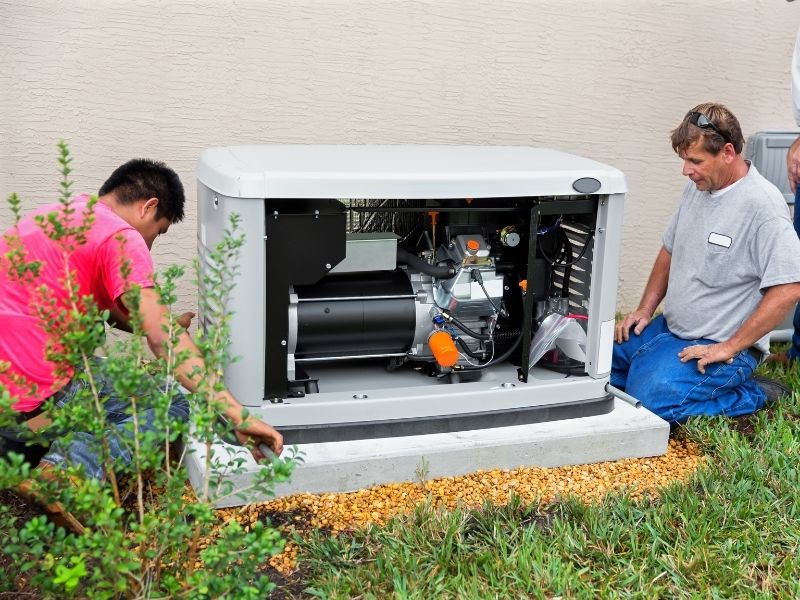The torrential rains and strong winds of hurricane season lead to flooding, downed power lines, and other damage that can wreak havoc on your home’s electrical system. Failure to prepare for hurricane season jeopardizes you, your home, and your family. Luckily, certain preemptive measures and precautions can keep you safe this year. To learn more, continue reading for six ways to prepare your electrical system for hurricane season.
6 Ways to Prepare Your Home’s Electrical System for Hurricane Season

1. Whole home surge protection.
One of the best ways to prepare your home’s electrical system for hurricane season is whole home surge protection. You typically install these near a home’s electrical service box and protect appliances by blocking the flow of excess electrical current. You can also purchase surge protectors that guard individual appliances or outlets. However, but whole home surge protection is more comprehensive for those in hurricane prone areas.
Whole home surge protectors keep major household appliances such as dishwashers, refrigerators, washing machines, and air conditioners safe from damage. These are, in fact, the appliances that are hard-wired to your circuit breaker. Power surges are very common during hurricane season, as a result of lightning and power outages, among other things. However, whole home surge protection keeps your home and electronic appliances safe year-round from all electrical surges, not just those caused by hurricanes.
2. Use ground-fault circuit interrupters.
Ground-Fault Circuit Interrupters, or GFCIs, are circuit breakers that quickly turn off power in the event of a ground fault. Ground faults are when electricity escapes its normal path and flows through a different conductor to the ground. GFCIs are necessary where electricity are in use in close proximity to water such as bathrooms, kitchens, garages, and near water-using appliances such as dishwashers and washing machines.
They are also highly recommended in basements and first-floor levels for those in areas prone to hurricanes. Flooding is very common during hurricane season, and water is a conductor of electricity. Fortunately, installing GFCIs protects your home and family from electrocutions, house fires, and other flood-related electrical issues. Therefore, this is a great way to prepare your home’s electrical system.
3. Install water level sensors.
Water level sensors are another way to protect your home’s electrical systems from hurricane-induced flooding. These sensors canalyze your home’s water use to provide real-time alerts of floods or leaks. Of course, these are common due to the heavy downpours of hurricane season.
Basement floods are costly, but these sensors allow you to keep your electrical system safe and minimize damages. They also lead to lower water bills in the long term.
4. Hurricane generators.
Having a hurricane generator on hand is the most effective way to prepare your home’s electrical system for hurricane season. In the event your home loses electricity, these generators provide a temporary power source until your electricity returns.
There are three different types of hurricane generators available, each with varying wattage and power to meet different electrical needs.
⎆ Inverter generators.
Inverter generators are small and a great source of short-term electrical power during a hurricane. They get their power from gas and produce anywhere from 800 to 5,000 watts of power.
⎆ Portable generators.
Portable generators also run on gas but offer more power than inverter generators. That’s because they provide electricity to multiple rooms for a short time. These generators typically produce 1,000 to 17,000 watts of power, depending on the make and model.
⎆ Standby generators.
Standby generators are the most powerful of the three options, as they produce anywhere from 6,000 to 59,000 watts of power. They turn on automatically and, in
Hurricane season typically starts at the beginning of June and runs until the end of November, so be sure to plan ahead when purchasing and installing a generator. There is likely to be a higher demand and limited supply during these months. Ordering early means you can get the generator you need with enough time for proper installation.
The HVAC system is one particularly important appliance that you must consider. Interestingly, you cannot power them by a portable generator without a manual transfer switch. You may power some by an automatic standby generator. However, this depends on the AC’s power consumption relative to the rest of your home.
If you want your home’s HVAC system to remain active by generator power, consider a ductless mini-split as an alternative. These systems install fairly simply, and they are much more efficient than central units. This also means they consume less power while portable or stand-by generators take over in an emergency.
5. Appliance preparation.
You should also prepare specific electronic appliances for hurricane season. Before the storm, be sure to turn off and unplug appliances and only turn them back on once it is safe. Even with a generator, leaving the appliance on and plugged in can spark a fire or electrocute a home member. It can also damage the appliances.
There are also several steps you can take to protect electronics from flood damage. Of course, if your appliances come in contact with water that means repairs or replacement. Relocate smaller appliances such as televisions and computers to a higher spot, such as a table or countertop. Also consider raising basement appliances such as washing machines, dryers, and water heaters with wooden slats or cinder blocks. In addition, it’s a good idea to construct a floodwall to protect from damage.
6. Professional electrical inspection.
Finally, a professional electrical inspection ensures that your home’s electrical system continues working in the event of a hurricane. They make the repairs or install equipment such as GFCIs and surge protectors. These installations keep your home, especially if professional technicians perform the installation.
In conclusion.
Use these tips to prepare your home’s electrical system for hurricane season. However, if you have any questions or suggestions, we always love to hear from you in the comments below. Also below are links to more useful articles about ALL things DESIGN for your home or business.
Images Courtesy of Canva.
Other Posts You Might Enjoy:
3 Essential Items You Must Have For Hurricane Season
Conscious Home Care: 10 Generator Maintenance Tips That Will Save You a Lot of Hassle Down the Line





